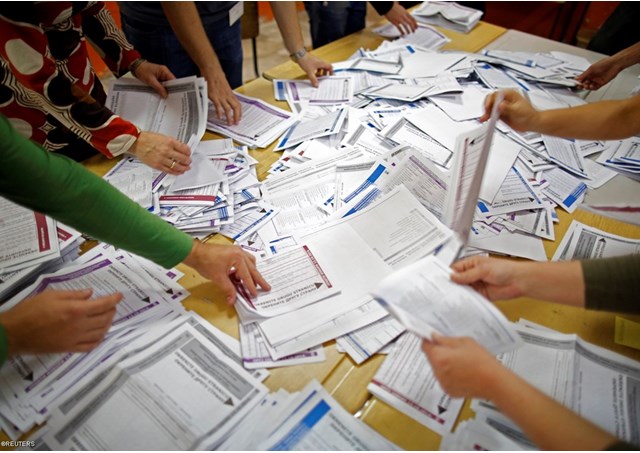
Nationalist candidates lead in Bosnia-Herzegovina vote

(Vatican Radio) Nationalist candidates in Bosnia-Herzegovina are ahead in the country's tripartite presidency following the country's seventh general elections since the end of the Bosnian war in 1995, first official results showed Monday. Sunday's ballot was held amid mounting public frustration over corruption and economic difficulties in the Balkan nation of nearly 4 million people.
Listen to this report by Stefan Bos
Initial results showed nationalist Bakir Izetbegovic, head of the main Muslim SDA party, set to win his second term as the Muslim member of the joint presidency with rougly a third of the votes. Izetbegovic, 58, is son of the country's late leader Alija Izetbegovic, a Muslim politician who tried to lead the nation through a war in which 100,000 people died.
He pledged to change his nation's destiny. “Moving Bosnia out of this reform stagnation, a move to Euro Atlantic integration, a decisive fight against corruption and crime and most of all, to spend the utmost energy on rebuilding the economy,” were among his priorities, he said.
He wants to keep the country united, but he faces two other nationalist politicians, Zeljka Cvijanovic and Dragan Covic, who were leading the race for the Serb and Croat member of the presidency, which steers foreign policy.
Covic has also said he wants the creation of a Croat entity within Bosnia, while Serbs are pushing for independence as well.
Votes were still being counted for other institutions of what is the world's most complicated political system, including the central parliament.
Among other institutions voters were choosing separate assemblies for the two semi-autonomous halves that make up Bosnia-Herzegovina since its 1990s war, known as the Muslim-Croat Federation and the ethnic Serb Republika Srpska.
A whopping 8,000 candidates were in the race for the high paid jobs, with lawmakers earning six times the country’s average wage of up to $525, making them relatively speaking the richest politicians in Europe.
It has added to scepticism among voters who seem angry that for many people the country remains one of Europe's most impoverished nations, with 44 percent unemployment and widespread corruption.
"I don't vote" said one man. He added: "Those who do probably think that something will change after the elections. But I don’t thinks so. And there is a growing number of people who feel the same.”
In fact, official turnout as roughly 54 percent, slightly lower than at the 2010 polls.
| All the contents on this site are copyrighted ©. |


